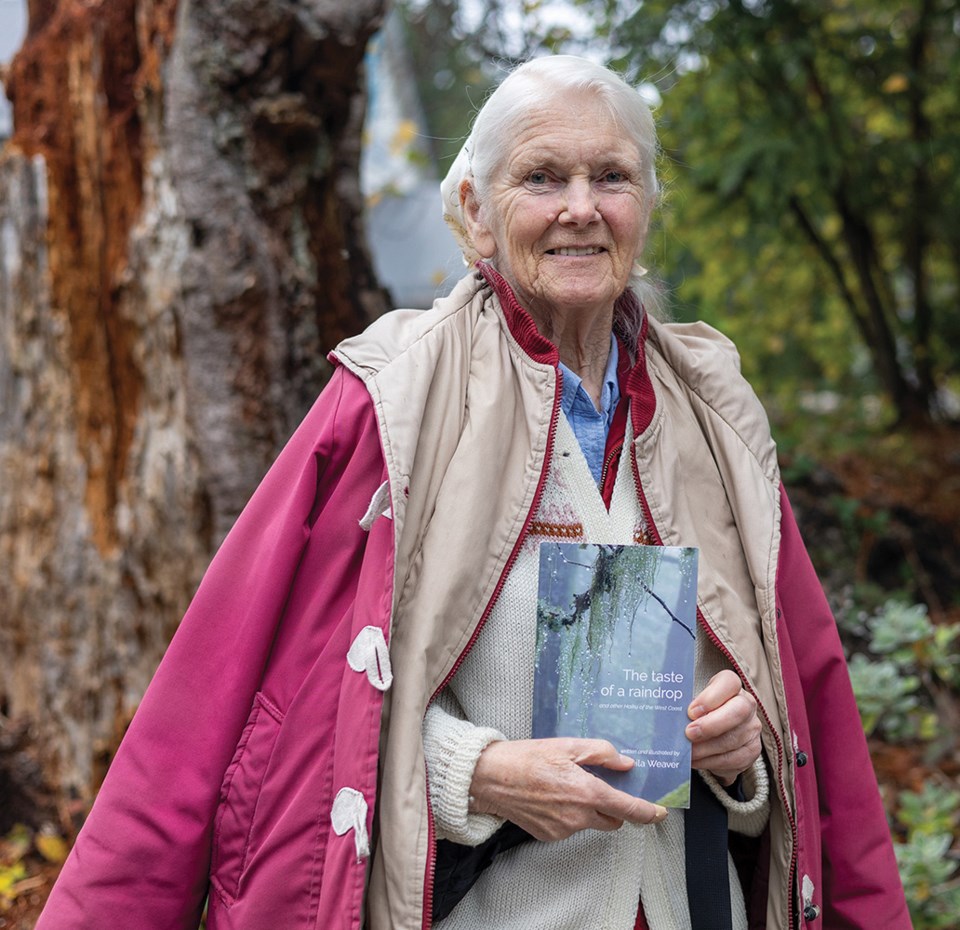The miniature poems of Sheila Weaver’s newly published debut verse collection present life on a different scale — one that demands sensitivity to nature’s rhythms and an openness to wonder.
The Taste of a Raindrop and other Haiku of the West Coast collects haiku written by the indefatigable gardener (she cultivates the grounds of the Sunshine Coast Museum and the Heritage Playhouse) during the past three years, accompanied by sketches she created over a three-decade period.
“One of the things I really like about haiku is how one can say, or open up the possibility of, more than the obvious,” said Weaver.
She penned her first haiku before moving to the Sunshine Coast in 1992, after a visit to a migratory bird sanctuary in the mouth of the Fraser River. A fellow bird watcher pointed out an owl camouflaged by bare branches. Sensing its presence demanded absolute stillness. “I went home and at some point I wrote what I thought was a haiku about it,” she remembered. Later, she shared the verse with a Japanese acquaintance. “He explained it wasn’t a real haiku,” she said. “I was so disappointed.”
Three years ago, in the midst of the COVID-19 pandemic, Weaver heard a radio interview with Winona Baker, author of Moss-Hung Trees: Haiku of the West Coast. Weaver was amazed: an entire volume dedicated to a Japanese poetic form that uses only 17 syllables? She devoured Baker’s book. She joined the Vancouver Haiku Group (“a very small group,” she admitted). Using Zoom, she presented poems at annual meetings of Haiku Canada, a national body.
Wandering Gibsons trails during COVID isolation, she heard a chorus of croaking frogs. “They normally stop before I get anywhere near,” she said. “But this group didn’t. They kept on singing. So I just sat down and listened for a while and I realized immediately the frogs weren’t slowing down because of COVID.”
“frogs’ pond chorus / no social distancing / for them,” she wrote. The poem appears in the first of four chapters, each dedicated to a season of the year. In springtime she exults in the promise of newly-turned sod: “setting out cabbage seedlings / the aroma / of fresh dug earth.” Summer is measured in beats of a sensory symphony: “moonset the flutter of bats at dusk.”
A common theme of Weaver’s poems is the particular agency of natural forces, which prompt existential reflection in the poet. “Over and over,” she writes in autumn, “mosquito probes blue corduroy / her short life.” In winter, a glimpse of colour proffers hope: “record-breaking cold / peeking through snow / primrose blossoms.”
“Some prefer to call [haiku] a one-breath poem,” she said, explaining that she no longer hews exclusively to conventional haiku’s 17-syllable limit. “I got the idea of playing around with the format from ones I’ve read, although I’m comfortable mostly with three lines.”
Weaver’s attention to botanical signals was sharpened during her composition of Plants of the Sunshine Coast, an as-yet published compendium inspired by observations at the Iris Griffith Field Studies and Interpretive Centre in Madeira Park. Its volumes (illustrated with 400 photographs) have been displayed at the Sunshine Coast Museum and Archives and the Gibsons Public Library.
“There are so many cues that we used to rely on from nature,” she said. “How do you know when to prune the roses? How do you know when to catch such-and-such an animal?” She recollects advice quoted by English gardener Alan Titchmarsh: plant warm weather annuals when you can sit comfortably on the soil with your bare bottom. “I wonder if it’s the head gardener that does it, or if an underling has to do that job,” Weaver chuckled.
Many of her haiku carry references to encumbrances of the COVID age. Inevitably, though, vitality and resurgence prevail: “Lengthening days,” Weaver writes, “we share / a careful hug.”
The Taste of a Raindrop and other Haiku of the West Coast is available for purchase from local book retailers, at the Davis Bay Christmas Market (Dec. 7), and online at lulu.com.



